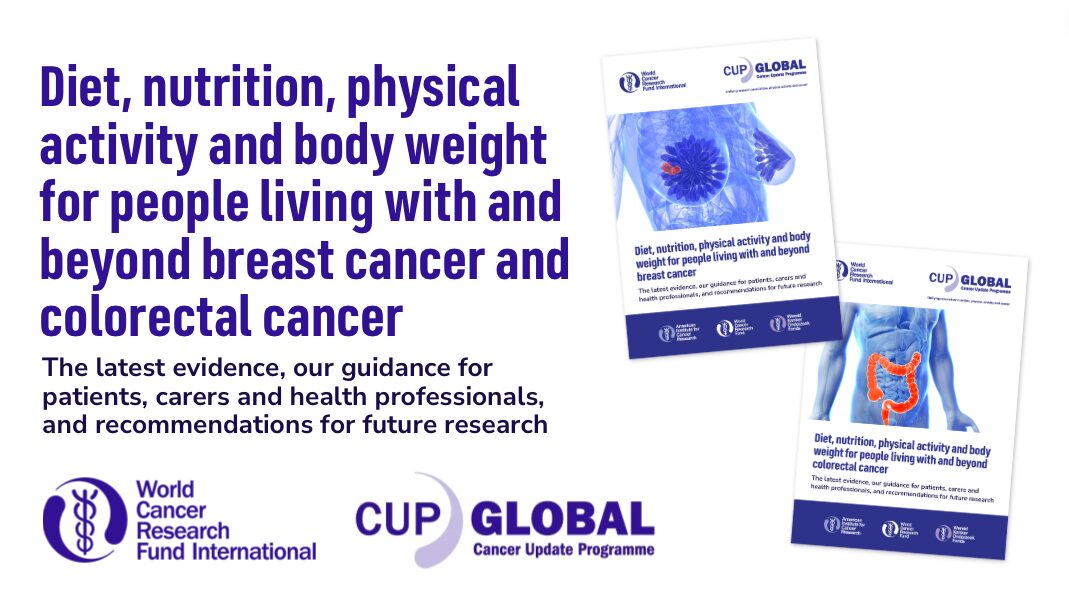New guidance for people living with and beyond breast and colorectal cancer

- New guidance developed with experts including patients and service users
- Our Cancer Prevention Recommendations are beneficial after a cancer diagnosis
- Comprehensive review of evidence and recommendations for future research directions
Two new in-depth scientific reports, launched at the World Cancer Congress in Geneva, bring together a full synthesis of the current evidence on diet, nutrition, physical activity and body weight from World Cancer Research Fund International’s Global Cancer Update Programme (CUP Global) on people living with and beyond breast and colorectal cancers.
For the first time, they present guidance for people living with and beyond breast and colorectal cancers, caregivers and health professionals. The reports also discuss the limitations of the existing research and make recommendations for future research to strengthen the evidence base.
Relevant and accessible
The CUP Global research team at Imperial College London conducted 7 systematic reviews, together assessing many thousands of recent research papers, studies and databases. World Cancer Research Fund convened expert panels, including oncologists and researchers, as well as patients and people with lived experience of cancer, to ensure the guidance is relevant and accessible.
Prof Andrew Renehan, Deputy Chair of the CUP Global Expert Committee on Cancer Survivorship, said:
These reports are the culmination of over 2 years of detailed work by World Cancer Research Fund International and the CUP Global partnership. They are a substantial and significant body of work and represent the best synthesis of our knowledge to date. As well as providing guidance for oncology health professionals and people living with and beyond cancer, they offer a clear direction for researchers seeking to advance the field.
Lynette Hill, Public Representative on the CUP Global panel, said:
Our challenge was to translate the complex findings from so many scientific papers into simple messages for people living with and beyond cancer. This will help health professionals to answer questions and inform their patients about the role of diet, physical activity and body weight, and the importance of these to their future health.
The reports show how nutrition, physical activity and body weight affect survival and recurrence. For people living with and beyond breast cancer, there is strong evidence that a physically active lifestyle improves health-related quality of life and that a diet high in fibre may improve health outcomes. For colorectal cancer, the evidence suggests that physically active lifestyles and a diet rich in wholegrain foods, and avoiding sugary drinks, may improve health outcomes and overall survival.
Key evidence in the reports was recently published in a series of linked papers in the International Journal of Cancer, published by the Union for International Cancer Control (UICC),
Dr Sonali Johnson, Head of Knowledge, Advocacy and Policy at the UICC said:
The guidance provided in these reports is about giving people living with cancer the tools they need to take control of their health. By focusing on practical changes such improving diet, staying active and managing weight, we can help reduce the risk of cancer coming back and improve the quality of life for so many, bringing us closer to a world where fewer lives are lost to cancer, and more people can live healthier, longer lives after diagnosis.
World Cancer Research Fund’s CUP Global is the world’s largest source of scientific research on cancer prevention and survivorship through diet, nutrition, physical activity and body weight. It is funded in partnership with American Institute for Cancer Research, World Cancer Research Fund in the UK and Wereld Kanker Onderzoek Fonds in the Netherlands.
Dr Helen Croker, World Cancer Research Fund International’s Assistant Director of Research and Policy, and Head of the CUP Global Secretariat, said:
As an evidence-based organisation, we have used the best available evidence to develop this process and produce practical guidance on diet, physical activity and body weight for people living with and beyond cancer. We hope this guidance will help support people to live longer, healthier lives.
By highlighting gaps in the evidence base, the reports show where further, high-quality research is needed. These include well-designed clinical trials and prospective cohort studies, as well as understanding the biological mechanisms involved. We hope this will be a springboard for further progress.
Download the reports
> Breast cancer
> Colorectal cancer
Download the executive summaries
> Breast cancer
> Colorectal cancer
Summary guidance in the reports
- Suggests that people living with and beyond breast and colorectal cancers consider increasing their physical activity, under the supervision of health care professionals.
- Suggests that people living with and beyond breast and colorectal cancers consider following as many of WCRF/AICR’s Cancer Prevention Recommendations as they are able.
- People diagnosed with breast cancer should consider:
- increasing their dietary fibre intake.
- avoiding gaining weight during and after treatment (if not underweight).
- People diagnosed with colorectal cancer should consider increasing their dietary intake of wholegrain foods, and reducing their sugary drink intake.
Much of the research in these reports build on the 2014 (updated 2018) report: Diet, nutrition, physical activity and breast cancer survivors, which was published as part of the WCRF/AICR Third Expert Report on the links between lifestyle/modifiable behaviours and cancer. At that time, research on cancer survival was limited, but there was enough evidence to conclude that people living with and beyond cancer should follow our Cancer Prevention Recommendations if they can.
